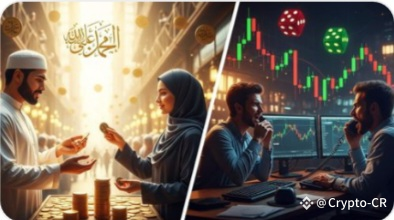Aaj ka Topic: Future Trading — Halal ya Haram?
Har Muslim trader ke mind me kabhi na kabhi yeh sawal zaroor aata hai:
“Quick profit ka best tareeqa!”
“Yeh to gambling lagti hai, shayad haram ho.”
Aaj hum hype aur extreme opinions ko side par rakh kar calmly samjhenge: future trading hoti kya hai, Islamic finance ka viewpoint kya hai, aur kaun si conditions me yeh halal ya haram ho sakti hai.
---
1. Future Trading Kya Hai?
●Simple shabdon me, future trading ek aisa contract hai jahan buyer aur seller agree karte hain ke wo ek specific asset (oil, gold, wheat etc.) ko ek fixed price par ek future date me exchange karenge.
●Example:
Aaj aap decide karte ho ke 3 mahine baad aap gold $2000/ounce me loge, chahe us waqt market price $1800 ho ya $2200.
●Ye do kaam ke liye hoti hai:
●Hedging: Risk se bachne ke liye, jaise ek farmer apne crops ke price girne se bachne ke liye abhi se rate lock kar le.
●Speculation: Sirf price ka guess laga ke profit lena, asset ko physically lene ka irada na hona.
2. Islamic Finance ke Principles
●Islamic finance me earning productive, fair aur transparent honi chahiye. Teen cheezen jo kisi deal ko haram bana deti hain:
1. Riba (Interest): Bina real trade ya productive activity ke paisa kamaana, jaise loan par interest.
2. Gharar (Extreme Uncertainty): Bohot zyada uncertainty jo trade ko gamble bana de.
3. Qimar (Gambling): Zero-sum betting jahan ek ka profit dusre ka loss ho, bina productive kaam ke.
3. Future Trading ka Process
●Contract Details: Asset, quantity, price aur expiry date pehle se decide hoti hai.
●Margin Deposit: Thoda paisa upfront security ke liye diya jata hai.
●Leverage: Chhote capital se badi position control karna (zyadatar interest-based hota hai).
●Settlement: Expiry par ya to asset deliver hota hai (rare) ya sirf price ka difference adjust hota hai.
4. Scholars ka Opinion
●Haram View (Majority):
●Mufti Taqi Usmani aur OIC Fiqh Academy ke mutabiq zyadatar futures haram hain, kyunke:
●Physical delivery nahi hoti.
●Extreme speculation hoti hai (qimar jaisa).
●Leverage me riba shamil hota hai.
●Contract me “jo maal aapke paas nahi” uski sale hoti hai, jo forbidden hai.
●Halal View (Minority):
●Kuch Malaysian scholars kehte hain agar:
●Asset halal ho.
●Physical delivery ka option ho.
●Interest-based leverage na ho.
●Risk controlled ho.
●To limited cases me future trading allowed ho sakti hai.
5. Haram Hone ki Wajahen
●Pure speculation → Gambling jaisa.
●Physical delivery ka na hona → Invalid sale.
●Leverage with interest → Riba.
●Price manipulation ka risk.
6. Halal Future Trading Possible Hai?
●Yes — lekin strict conditions ke saath:
●Asset real aur halal ho (oil, wheat, gold etc.).
●Delivery actual me ho, sirf cash settlement na ho.
●Apne pure capital se trade karo, interest-based leverage avoid karo.
●Exchange Shariah board se approved ho (jaise Malaysia ka FCPO contract).
7. 100% Halal Alternatives
●Spot trading halal assets me.
●Islamic stocks aur ETFs.
●Sukuk (Islamic bonds).
●Halal mutual funds.
●Real estate investment (without interest).
Final Advice:
●Zyadatar log futures me speculation ke liye enter hote hain, jo Islamically haram hota hai. Agar aap genuinely hedge kar rahe ho, no riba, no gharar, no qimar, aur delivery ka option hai — to kuch cases me scholars ne ijazat di hai.

